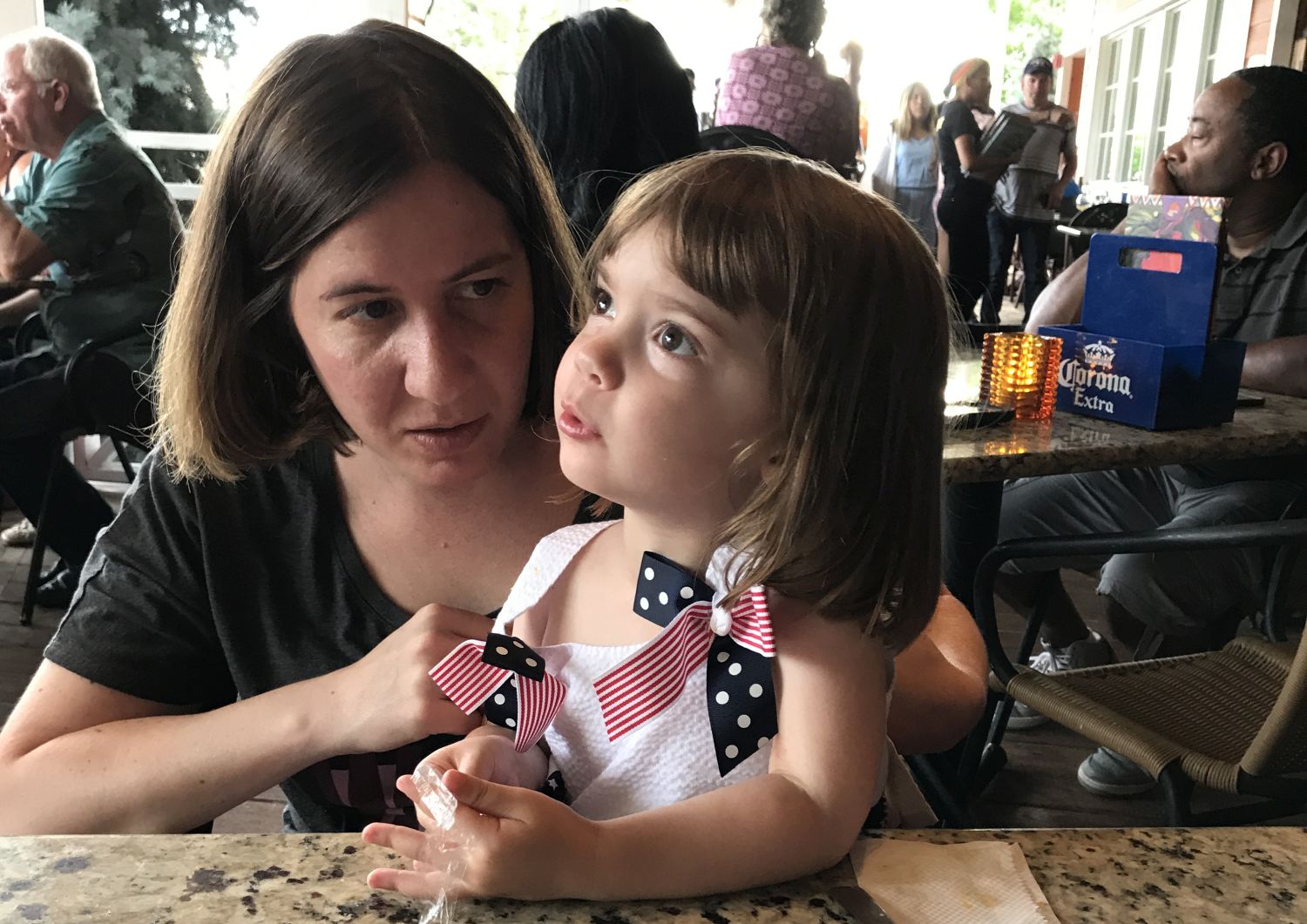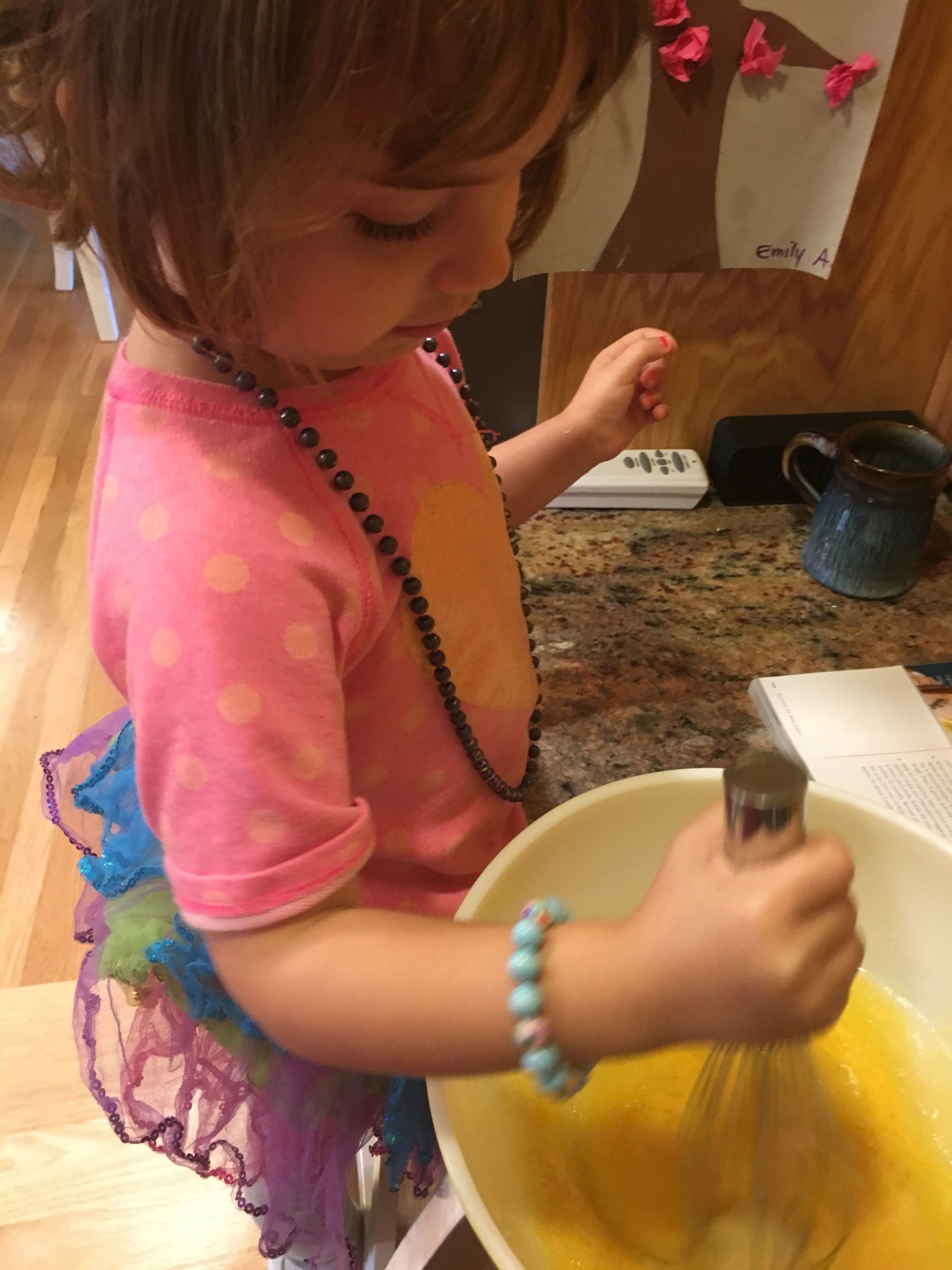We are watching TV in the back room — pressed up next to each other on the couch, dinner plates in our laps — when I tell my 4-year-old daughter to please eat her sandwich.
“Don’t be bossy, Mommy,” she says, and I whip my head around to gape at her.
“Right?” she asks, smiling uncertainly. “Like me. I’m bossy, right?”
I feel panic. Just the day before, I had read a piece on Motherly from Wendy Snyder, a positive-parenting teacher and family coach, who had put together a list of 20 phrases to use when your child isn’t listening. One of the phrases she’d asked readers to remove from their vocabulary was “don’t be bossy,” as it could squelch a child’s desire to develop their leadership abilities. Instead, Snyder recommended reminding kids to use their teamwork skills, teaching them how to be strong leaders who lead with integrity.
At the time, I’d vowed to put Snyder’s list of alternative phrases into practice in the hopes of leveling up in the parenting department. Clearly, I am too late, I think. I am a terrible mother and there is no turning back.
How We Talk To Our Children
Peggy O’Mara, the former editor and publisher of Mothering Magazine, once said that the way we talk to our children becomes their inner voice, a line that has since gone viral among mommy bloggers. Similarly, psychologist Melanie Greenberg, Ph.D., has written that talking to kids in an authoritarian manner can keep them from developing a sense of autonomy, and can shrink their self-esteem.
Becoming the mother of a daughter has made me especially mindful of how I communicate. After all, the way we talk to our daughters versus the way we talk to our sons can often reinforce gender stereotypes. Though the parents of today are undoubtedly making more of an effort to engender autonomy in their daughters, research still shows that parents — and especially fathers — use more achievement-oriented language with their sons and more emotion-oriented language with their daughters. If I want to raise my daughter to be an independent woman, I have to be careful not to slip into gendered language that could prove detrimental to her development.
And so I read countless books and articles about how to communicate with my daughter and even invest in a deck of conscious communication cards designed to model respectful communication and build self-regulation skills. By the time I stumble upon Snyder’s list, I feel as if I’m doing a decent job. When she bursts into tears over something I consider to be inconsequential, I resist the urge to dismiss her outsized emotions and instead tell her it’s OK to cry, ask her about what she’s feeling and why, and discuss how we might fix the issue.
When she does something undeniably against “The Rules” or whines so much I think my head might explode, I try not to blurt out, “Stop being bad!” Instead, I tell her that I love her no matter what, even if I don’t always like her behavior.

When she is wearing on my last nerve — a thing that occurs more often than I’d like to admit because I work from home even in non-pandemic times, where there are no clear boundaries — I remind myself to breathe before reacting. It’s the same sort of advice I give to her when she is upset.
Many of these tactics appear on Snyder’s list and, when I see them there, I feel just a teensy bit smug.
It Can Be Tough To Make A Behavior Change
But there are other areas in which I’m not up to scratch, and these bad language habits are harder to shake.
For example, when I’m struggling to finish an assignment and my daughter decides to blanket the entire house in confetti or to set up shop in my home office, loudly singing her own lyrics to the tune of the “Greatest Showman” soundtrack, it’s hard not to snap at her to be quiet. (Though when she threatens a meltdown in public, I’ve gotten better at asking her to “please talk softly” out of respect for the people around us.)

When I’m anxious about getting somewhere on time, I can’t help but shout at her to hurry up. In those moments, Snyder’s advice to ask whether they want to leave now or in 10 minutes seems unfeasible. Sure, it would give her a sense of autonomy to make that decision but I’m also unwilling to disrespect the time of those who are waiting on us — and that’s the lesson I really want my daughter to learn.
When I find my daughter hiding under the kitchen table, about to eat candy I told her she couldn’t have, I get angry.
“You should know better,” I say, which is — word for word — number four on Snyder’s list of no-nos because of the way in which it is blatantly shaming the child. When I cool down, I try to take some of Snyder’s advice. I explain that I’m more upset about her dishonesty than anything else. I tell her that we have to be able to trust each other. Then I ask her what she’s learned from the situation.
And then there are all the “don’ts.” Don’t do this. Stop that. Don’t do that other thing. For the love of god, PLEASE STOP. Snyder recommends flipping these forms of negative communication around and instead making it clear what you want them to do. Which leads to two weeks in which I constantly catch myself saying “don’t” when it’s already too late. In fact, as I was typing this very sentence, I actually said, “Don’t leave that plate there,” only catching myself after the fact and then adding on, “Could you please put it in the sink?”
But my biggest offense is telling my daughter to “be careful.” It’s a phrase that, since reading Snyder’s piece, I catch myself saying approximately 10 billion times a day. And I feel terrible about it.
Communication expert Anna Chui writes that when we constantly tell our children to be careful, the phrase not only becomes meaningless but also leads kids to believe that nothing is safe. Not only this, but discouraging risk-taking activities can lead to greater anxiety later in life. As a result of hearing this one tiny phrase over and over again, kids become meeker and less willing to take risks. The better option, writes Snyder, is to give children greater guidance around how to be safe, and to encourage problem-solving.
But even after reading this, I find myself incapable of expelling the phrase from my daily vocabulary. To be a mother is to always be afraid. I consider it my job to keep my daughter safe from any terrible eventuality. I know this is impossible. I know it is inevitable that she will be hurt, many times over. But I love her more than I love myself. I want to wrap her up, make her impenetrable.
In reading Snyder’s advice, however, I can already recognize that my inability to break this habit has been a detriment to her. She is more cautious than her friends. More unwilling to engage in risky physical activities. While the other kids climb and jump and slide, my daughter avoids. She hesitates. She flinches.
I’m Not A Terrible Parent, And Neither Are You
Clearly, I still have some work to do. But that’s OK. Paying extra attention to my language for two weeks is only a beginning. It can take months of daily practice before a new behavior becomes habitual.
Not only that, but it’s much easier to respond to your child in a reasonable manner when you’re not stressed out of your mind. And when mothers, in particular, are not provided with the structural support they need to manage their varied responsibilities, it’s inevitable that they’ll occasionally fly off the handle and fall back on knee-jerk, less-than-ideal language. My own situation — as the work-at-home mom of a young child — is the perfect recipe for these types of setbacks.
All I can do is work on it. Fail. Get frustrated. Work on it some more.
And I’ve already become more mindful. Instead of snapping at my daughter to “be quiet” when I’m trying desperately to focus on work, I ask her calmly: “If you’d like to continue singing, could you please do it in the living room? At least until I’m done working?”
And instead of peppering all of our interactions with “don’t,” I flip the script, asking her to “please” do what it is that I actually want her to do.
In making these polite requests of her — person to person — I find that my daughter is quicker to comply. Being reprimanded doesn’t feel so hot. But being asked to help out mommy makes her feel like she’s contributing to the household in an important way. As someone who’s transitioning into kindergarten, I can tell she gets satisfaction out of flexing those “big girl” muscles.

Baby steps, right? For both of us.
I feel optimistic that my daughter will turn out just fine despite my many shortcomings. She is already kind, creative, hilarious, adorable and a smarty-pants to boot.
If I continue to work on my communication skills — especially my propensity to say “be careful” — she might also be brave. Fingers crossed.
This story originally appeared on Simplemost. Checkout Simplemost for additional stories.


